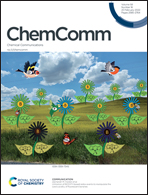Chemical structure modulation in conductive MOFs by adjusting the oxidation state of the ligand and introducing alkali metal ions†
Abstract
The metal–organic frameworks (MOFs) have attracted more and more attention and some MOFs have shown advanced electrical conductivity. Based on previous work about MnTHBQ (THBQ = tetrahydroxy-1,4-benzoquinone), we present two strategies, variation of the ligands’ oxidation states and introducing alkali ions (Rb+ or Cs+), to modulate the structures of MOFs and obtained three new MOFs: MnHHB (HHB = hexahydroxybenzene), MnRbTHBQ and MnCsTHBQ. Different from the cubic lattices in the group of Pm![[3 with combining macron]](https://www.rsc.org/images/entities/b_char_0033_0304.gif) of MnTHBQ, they exhibit hexagonal unit cells in the group of P6/mmm. This work highlights the importance of the oxidation state of the ligand in constructing the out-of-plane charge transport pathway and indicates that employing a redox-active ligand or adding alkali metal ions could be an optional strategy for manipulating the characteristics of MOFs.
of MnTHBQ, they exhibit hexagonal unit cells in the group of P6/mmm. This work highlights the importance of the oxidation state of the ligand in constructing the out-of-plane charge transport pathway and indicates that employing a redox-active ligand or adding alkali metal ions could be an optional strategy for manipulating the characteristics of MOFs.



 Please wait while we load your content...
Please wait while we load your content...